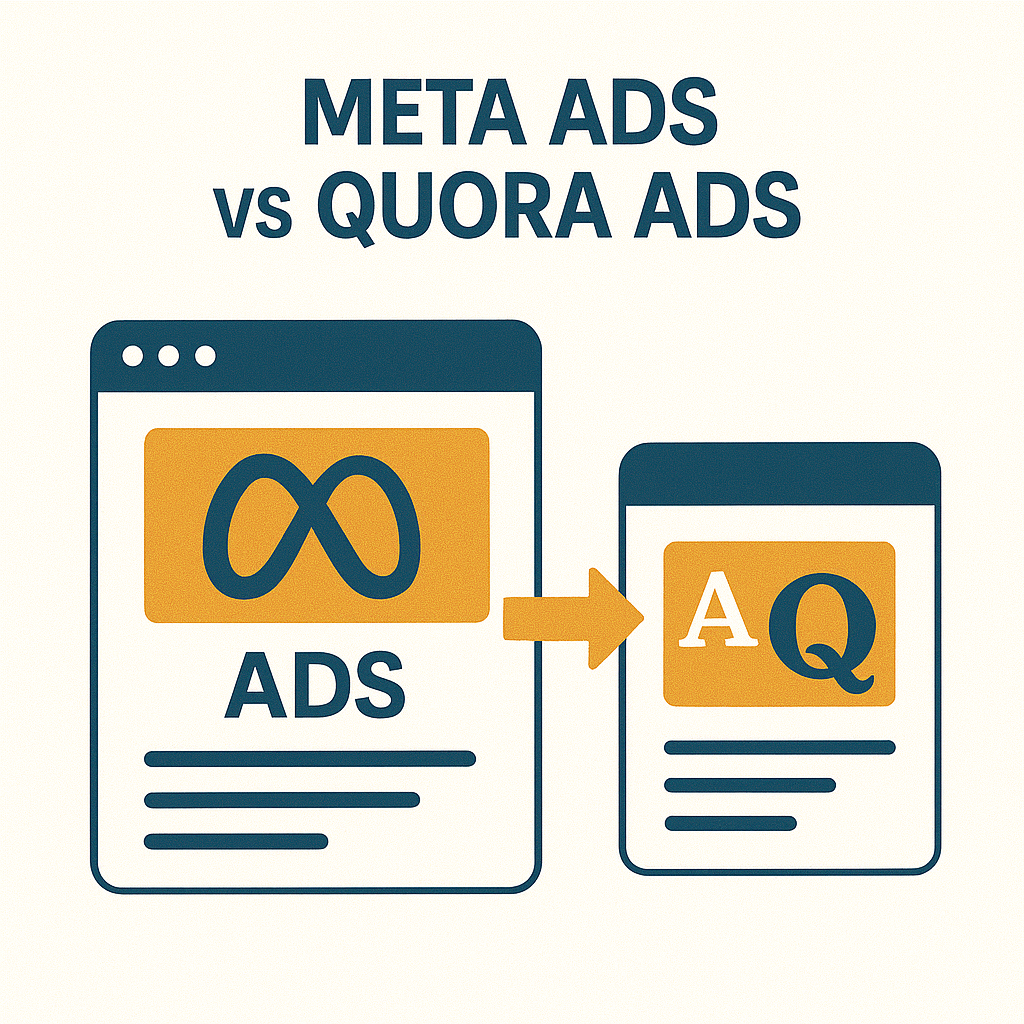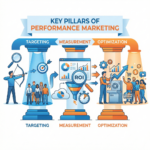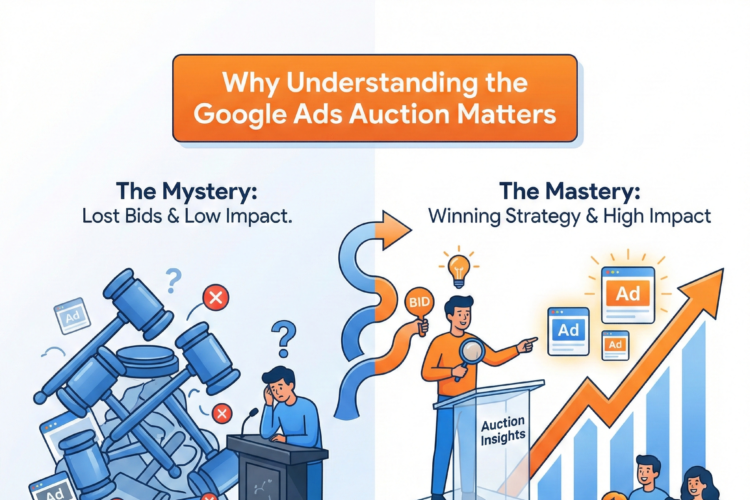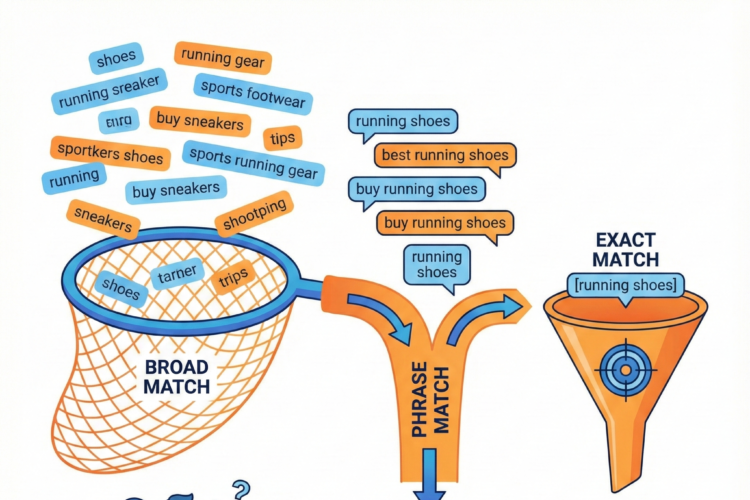
Meta Ads vs Quora Ads: Which Platform is Better for Your Advertising Goals in 2025?
In today’s diversified digital marketing landscape, choosing the right ad platform is crucial. While Meta Ads (Facebook, Instagram, Messenger) remains one of the largest and most powerful advertising ecosystems, Quora Ads has emerged as a niche platform for intent-driven, knowledge-seeking audiences.
This comprehensive comparison explores Meta Ads vs. Quora Ads across targeting, costs, ad formats, user behavior, analytics, and use cases—so you can decide where to allocate your budget in 2025.
📊 Platform Overview
| Feature | Meta Ads | Quora Ads |
|---|---|---|
| Reach | 3.96+ billion users (across Facebook, IG, WhatsApp, Messenger) | ~300 million monthly active users |
| Audience Type | Broad and diverse | Niche, curious, research-focused |
| Ad Manager | Meta Ads Manager | Quora Ads Manager |
| Intent Type | Passive (interruption-based) | Active (intent-based) |
| Learning Curve | Steeper, complex features | Simple, beginner-friendly |
🎯 Targeting Capabilities
✅ Meta Ads Targeting
-
Demographics (age, gender, income, education)
-
Detailed interests (fitness, fashion, tech)
-
Behaviors (shopping, travel, device use)
-
Custom audiences (email lists, website visitors)
-
Lookalike audiences
-
Retargeting across Meta properties
Strength: Granular and data-rich targeting due to Meta’s social graph and pixel tracking.
✅ Quora Ads Targeting
-
Contextual targeting (based on topics/questions)
-
Interest targeting (broader categories)
-
Behavioral targeting (based on past activity)
-
Question targeting (target users engaging with specific questions)
-
Audience matching (email lists)
-
Retargeting
Strength: Strong contextual targeting—ads are shown when users are actively researching.
💸 Cost Comparison
| Ad Platform | CPC (Avg.) | CPM (Avg.) | CPA (Avg.) |
|---|---|---|---|
| Meta Ads | $0.40–$2.00 | $5–$15 | $5–$30 |
| Quora Ads | $0.20–$1.50 | $3–$12 | $5–$25 |
Insights:
-
Quora often has a lower CPC and CPM due to less competition.
-
Meta allows higher scalability but may require larger budgets to compete.
🧠 User Intent and Behavior
Meta Users:
-
Browsing for entertainment, social content, or news
-
Low buying intent unless creatively interrupted
-
Great for brand awareness, impulse purchases, and emotional triggers
Quora Users:
-
Actively searching for answers and knowledge
-
Higher intent and information-ready
-
Ideal for education-driven B2B/B2C offerings, SaaS, and complex solutions
📐 Ad Formats Comparison
| Format | Meta Ads | Quora Ads |
|---|---|---|
| Image Ads | ✅ | ✅ |
| Video Ads | ✅ | ❌ (as of now) |
| Carousel Ads | ✅ | ❌ |
| Stories | ✅ (Instagram, FB) | ❌ |
| Lead Forms | ✅ | ✅ |
| Text-Only Ads | ❌ | ✅ |
| Native Answer Ads | ❌ | ✅ (shown in answers) |
| Promoted Answers | ❌ | ✅ (boost your own answer) |
Conclusion: Meta has more visually rich formats; Quora focuses on native, non-disruptive formats.
📊 Analytics & Reporting
Meta Ads Manager:
-
Advanced performance breakdown
-
A/B testing tools
-
Attribution modeling
-
Offline conversions
-
Automated Rules & Budget optimization
Quora Ads Manager:
-
Simple interface
-
Key metrics: impressions, clicks, CTR, CPC, conversion tracking
-
Conversion pixel and event tracking (basic compared to Meta)
Note: Quora lacks the advanced AI-driven features of Meta but provides clarity and ease.
💼 Use Cases and Ideal Industries
| Industry | Meta Ads | Quora Ads |
|---|---|---|
| eCommerce | ✅✅✅ | ✅ |
| SaaS | ✅✅ | ✅✅✅ |
| Education | ✅✅ | ✅✅✅ |
| Health & Wellness | ✅✅✅ | ✅✅ |
| B2B | ✅✅ | ✅✅✅ |
| Finance | ✅✅ | ✅✅✅ |
| Mobile Apps | ✅✅✅ | ✅ |
Insight:
-
Meta is excellent for D2C, lifestyle, and retail products.
-
Quora excels for thought leadership, high-intent research, and complex sales funnels.
⚖️ Pros & Cons Summary
✅ Meta Ads – Pros
-
Massive global reach
-
Advanced targeting & lookalikes
-
Visual storytelling with creative formats
-
Powerful AI and automated campaign optimization
❌ Meta Ads – Cons
-
Ad fatigue and banner blindness
-
High competition and increasing CPM
-
Steep learning curve
-
Frequent algorithm changes
✅ Quora Ads – Pros
-
High user intent and niche targeting
-
Lower CPC and less competition
-
Contextual alignment with content
-
Strong for long-consideration products
❌ Quora Ads – Cons
-
Smaller reach
-
Limited creative formats (no video, no stories)
-
Limited brand awareness impact
-
Not ideal for impulse buying
🧠 Strategic Recommendations
| Goal | Recommended Platform |
|---|---|
| Brand awareness at scale | Meta Ads |
| Drive impulse purchases | Meta Ads |
| Capture high-intent leads | Quora Ads |
| Educate & nurture users | Quora Ads |
| Launch B2B or SaaS product | Quora Ads (then retarget on Meta) |
| Retargeting with dynamic creatives | Meta Ads |
| Answer objections via content | Quora Ads (Promoted Answers) |
🛠 Pro Tips for Success
Meta Ads Tips:
-
Use creative testing (A/B different headlines, images, formats)
-
Implement Facebook Pixel + Conversion API
-
Use Lookalike Audiences with first-party data
-
Automate retargeting across Facebook + IG
-
Leverage Reels and Story ads for higher engagement
Quora Ads Tips:
-
Target specific questions or answer topics
-
Boost high-quality answers with “Promoted Answers”
-
Add UTMs to track answer influence on conversions
-
Retarget people who engaged with your questions/answers
-
Combine Quora Ads with content marketing (lead magnets)
🏁 Final Verdict
| Category | Winner |
|---|---|
| Audience Size | Meta Ads |
| Intent & Research | Quora Ads |
| Ad Format Variety | Meta Ads |
| Ease of Use | Quora Ads |
| B2B Marketing | Quora Ads |
| D2C/Ecommerce | Meta Ads |
| Cost Efficiency | Quora Ads |
| Retargeting Power | Meta Ads |
In summary:
-
Choose Meta Ads for scale, visual branding, impulse sales, and retargeting.
-
Choose Quora Ads for intent-driven leads, B2B marketing, SaaS, or niche education-based funnels.
For many brands, the ideal approach in 2025 is omnichannel: use Quora Ads to build trust and intent, and Meta Ads to retarget, convert, and scale.
Author



